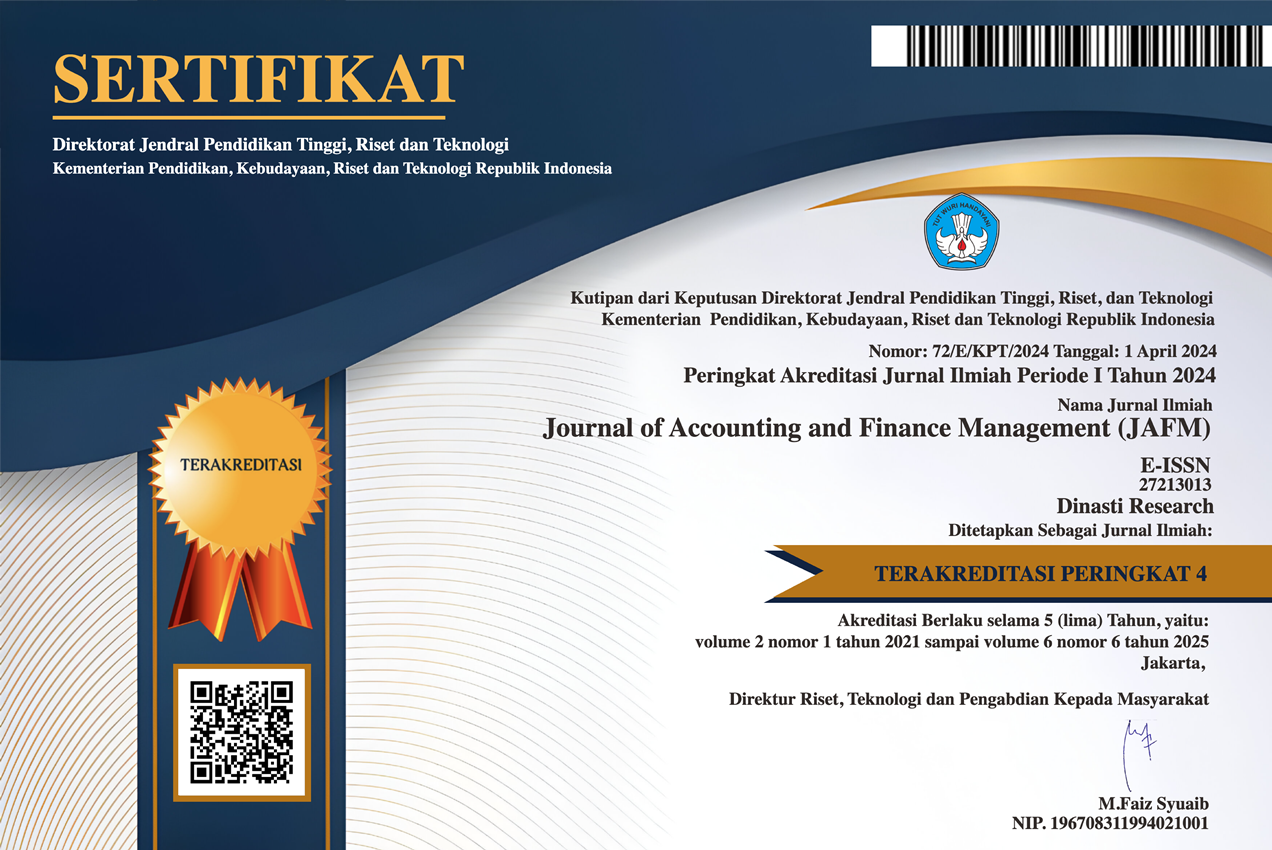Application of Knowledge Management in Efforts to Develop Human Resource at the Directorate General of Taxation
(Literature Review of Human Resource Management)
DOI:
https://doi.org/10.38035/jafm.v3i6.174Keywords:
Knowledge Management, Directorate General of TaxationAbstract
Knowledge management presents an opportunity for changes in the field of information and libraries in order to create forms that are more relevant to changing times. The purpose of this research is to understand the application of knowledge management at the Directorate General of Taxation. The method used in this study is a simple qualitative method through field object observation techniques and literature review. Based on research results, the Directorate General of Taxation has implemented knowledge management very well and consistently so that efforts to achieve individual and organizational performance can be achieved significantly. Through the implemented knowledge management system, institutional transformation becomes faster because all kinds of knowledge can be properly archived and easily accessed by all employees.
References
Bagia, Wayan I. (2015). Organizational behavior. Yogyakarta: Graha Science
Bhatt,D. (2000). EFQM Excellence Model and Knowledge Management. Implications.
Budiyanto, T. (2018). Willingness of Tax Auditors to Share Knowledge Through Knowledge Management Systems (Studies at the Directorate General of Taxation). Accounting and Business Information Systems Journal, Vol.6 No.4.
Davenports, Thomas, H.,and Laurence Prusak. (1998). Working Knowledge: How Organizations Manage What They Know. Harvard Business School.
Davidson, Carl and Philip Voss. (2003). Knowledge management: An Introduction to creating, competitive advantage from intellectual capital. New Delhi: Vision Books
Davenport, Thomas, H., and Laurence Prusak. (1998). Working Knowledge: How Organizations Manage What They Know. Harvard Business School Press, Boston.
Debowski,Shelda. (2006). Knowledge Management. Melbourne and Sydney: John Wiley and Son Australia, Ltd.
Gatot Subroto. (2020). Knowledge Management in Tax Administration: A Case Study in Indonesia. Scientax, Vol.1 No.2.
Hakim, SN (2007). Planning and Preparation for Retirement. Surakarta: Muhammadiyah University of Surakarta.
Hidayat, M. (2020). Talent Management and Knowledge Management Analysis of Employee Performance Through Employee Retention (Study on Employees of the Directorate General of Taxation, Ministry of Finance, Republic of Indonesia). Jakarta Veterans National Development University.
Kaymaz, Kurtus. (2010). Business and Economics Research Journal. Exchange. turkey.
Decree of the Director General of Taxes Number KEP-389/PJ/2020 dated 31 August 2020 concerning the Strategic Plan of the Directorate General of Taxation for 2020-2024.
Martikasari, Saturday. (2012). The Influence of the Job Rotation System on Improving the Performance of Librarians at the Diponegoro University Library Upt. "Journal of Library Science, vol. 1, no. 1, pp. 96-103.
Regulation of the Minister of Finance of the Republic of Indonesia Number 184/PMK.01/2020 dated 23 November 2020 concerning Amendments to the Regulation of the Minister of Finance Number 210/PMK.01/2017 concerning Organization and Work Procedures of Vertical Agencies Directorate General of Taxation
Rivai, Veithzal and Jauvani Sagala. (2011). Human Resource Management. For Companies From Theory to Practice. Jakarta: Rajawali Press.
Saravani, Shahin Rasouli. and Abbasi, Badri. (2013). Investigating The Influence Of Job Rotation On Performance By Considering Skill Variation And Job Satisfaction Of Bank Employees. Technical Gazette 20, 3: 473-478.
Riska Gustian, Taufik Hidayat and Achmad Fauzi (2022). Human Resource Training and Development (A Literature Review on Human Resource Management Science). Jakarta : Journal of Management Economics and Information Systems.
Harvard College in Bosque (2017). Definition of Knowledge Management / Knowledge Management According to Experts. Son of Knowledge.
Hutagalung, D., Novitasari, D., Silitonga, N., Asbari, M., & Supiana, N. (2021). Building Organizational Innovation: Between Transformational Leadership and Knowledge Management Processes. Educative: Journal of Educational Sciences, 3(6), 4568-4583.
Latief, A., Nurlina, N., Medagri, E., & Suharyanto, A. (2019). The Effect of Management Knowledge, Skills and Attitudes on Employee Performance. JUPIIS: Journal of Social Sciences Education, 11(2), 173-182.
Nisa, RC, Astuti, ES, & Prasetya, A. (2016). The Influence of Talent Management and Knowledge Management on Employee Performance (Study on Employees of PT. PLN (Persero) Distribution of East Java, Surabaya). Journal of Business Administration (JAB), 39(2).
Sagala, TW, Manapa, EA, Ardhana, VYP, & Lewakabessy, G. (2020). Comparison of Knowledge Management Implementation in Various Industries. JTIM: Journal of Information Technology and Multimedia, 1(4), 327-335.
Short in Riadi, Muchlisin. (2020). Knowledge Management (Definition, Function, Component, Type, Level and Cycle). Accessed on 12/3/2022, from https://www.kajianpustaka .com/2020/09/Knowledge-Management.html
Siagian, GS, & Ikatrinasari, ZF (2019). The influence of knowledge management on innovation: the case of the IT industry in Indonesia. Operations Excellence, 11(1), 71-80.
Sumardi, R. (2019). Evaluation of the Implementation of Knowledge Management at the Jakarta Primary Tax Service Office. Journal of Social and Humanities, Vol.4 no.1.
Sutrisno, Edy. (2016). Human Resource Management, Kencana Prenada Media Group, Jakarta.
Sutarto, JT (2013). Retirement, Not the End of Everything. Main Library Gramedia.
Wicaksono, PD (2020). Knowledge Management System Model in the Personnel Management Unit at the Directorate General of Taxation. Bakrie University.
Downloads
Published
How to Cite
Issue
Section
License
Authors who publish their manuscripts in this journal agree to the following conditions:
- The copyright on each article belongs to the author(s).
- The author acknowledges that the Journal of Accounting and Finance Management (JAFM) has the right to be the first to publish with a Creative Commons Attribution 4.0 International license (Attribution 4.0 International (CC BY 4.0).
- Authors can submit articles separately, arrange for the non-exclusive distribution of manuscripts that have been published in this journal into other versions (e.g., sent to the author's institutional repository, publication into books, etc.), by acknowledging that the manuscript has been published for the first time in the Journal of Accounting and Finance Management (JAFM).




























